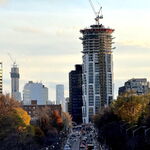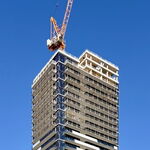Rosedale is not known for social housing and mental health focused agencies. Parkdale is known for those things. Re-inforcing that image by giving those in need an even greater reason to go there doesn't help. I don't think the Beaches or Rosedale are any more difficult to get to. Where would they be going from and to? Once they are there they probably don't need to go anywhere.
No, Rosedale is not known for its social housing. So then why set up such housing there? Would it present any practical benefits to the people who would reside there, or would it just satisfy your resentment towards people who are wealthy?
The housing facilities are being spread over a number of wards and are geared towards a number of groups of people with specific needs. That will neither satisfy your agenda, and in the long run it probably will do nothing to alter existing attitudes towards Parkdale that you yourself appear to be perpetuating.
As to the notion that once people are "there" they probably don't need to go anywhere else, how do you know that? Are you assuming that "they" have no needs, no wants, no requirements to go other places? Maybe you should park your assumptions for a moment and pretend not to know what "they" need or want.
What was Jane and Finch before the social housing was built? My guess is it was a green field development. Was there a big need for housing at the corner of Jane and Finch? Of course not. People came there because that is where the housing was.
If you read the article you will note that there is an effort to integrate the housing into existing neighbourhoods. That is hardly representative of a greenfield development. Facilities consisting of 50 units are nothing like the housing efforts of 40 years ago. By integrating housing into established neighbourhoods, the people who reside in that housing have access to the necessary services of that neighbourhood. They don't have to live in towers in the park, or travel great distances for their needs. Hopefully this plan will see all these new facilities well integrated into existing neighbourhoods.
There is opportunity to be found by mixing with the mainstream. That opportunity can be in the form of kids going to school with people of different races and financial situations which fosters greater understanding between people and improves contacts those fiscally disadvantaged youth have to those who might have links to employment opportunities or simply foster a more optimistic view of their future. The best way to learn is by being immersed in it. If you want to get ahead in business there is an advantage to being surrounded by those who are in the business world and have contacts. If you want to learn French the best way is to be surrounded by people speaking French. The best way to become part of mainstream Canada is to be immersed in mainstream Canada. Also, spreading these issues across the city evenly lets people see a clearer picture of what condition the city is in. If one neighbourhood sees only the negative side their view of the conditions of the city will be skewed negatively, and on the other side if a neighbourhood never sees any of the social problems then there is a problem that there is less incentive to deal with those issues. I see a much greater problem with putting a whole bunch of socially disadvantaged in one place than I see spreading them across the city.
First, the outline presented in the article appears to be an effort to mix these facilities with "mainstream" neighbourhoods. These are not entire communities being built, but smaller facilities being integrated into existing neighbourhoods. They are, in essence, already being mainstreamed!
Second, you contradict yourself by first making a statement about exposure of youth to other cultures and so on, then make reference to being immersed in a linguistic totality to learn a language or to be surrounded by people in business in order to get ahead in business. So you want diversity, but then argued for people being surrounded by groupings of people who are like-minded?
How would you presume to place people to effect your necessary desires for them?
You suggest immersion into mainstream Canada, but then neglect to define "mainstream" Canada. Should it be assumed that you have the final say on what that is?
Third, concerning the spreading of these facilities across the city so as to show problems to other residents, it sounds as if you would like to use people in need as a means of illustration to others. This goes back to my original point that there is a punative attitude being exhibited here: you want to use people as a means of displaying specific problems to those who are fortunate enough not to be suffering. In my opinion, people should not be used like that.




